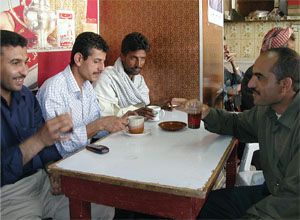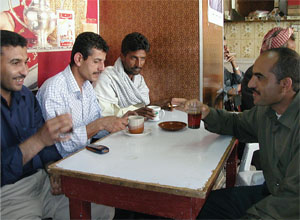
Meeting friends at a cafe has a special flavor [Archives:2006/917/Last Page]
January 2 2006
 |
ymayasi@yahoo.com
Yemen knew cafes from earlier times. They were places where coffee, tea and other beverages were served and their appearance was linked to the history of Yemen's coffee trade monopoly.
However, as time lapsed, they gradually evolved into 'semi-parliaments' for exchanging opinions. Yemenis of different thoughts and classes met there, breaking all social, political and economic barriers. Such cafe meetings were simple and unpretentious and contributed to the spread of witty jokes and humor.
Yemen's most reputed cafe cities were Aden, Sana'a, Taiz, Hodaidah and Hadramout; however, they first appeared in Aden. Research indicates that Aden's oldest cafe was Sialn (Ceylon) in Craitor. There also was Kashir Cafe, owned by Hashim Al-Saqaf. Other Aden cafes were the Alshajara (tree) and another called Alqomairy.
Aden residents used to see their leaders drinking tea and coffee amongst ordinary citizens in these cafes, breaking social barriers – one of whom was president Salmeen.
Cafes in Aden and other parts of Yemen used to be open all day until late at night. Yemenis gathered to drink coffee, tea and other beverages while becoming absorbed in political, cultural, social, literary and sports discussions. They also listened to songs there, with most composers introducing their new songs in special cafe sessions. Many such composers gained a reputation and became famous through cafe audiences. Customers also listened to news on the cafe's radio and newspapers read aloud, as most were illiterate. Writers also wrote their literary works there, as such cafes inspired them.
Cafes also were the meeting places of free liberals who attacked colonization. Some cafe owners resisted colonization and the Imam's regime, which is why they often were under surveillance by the rulers' intelligence. Most activists were arrested in such cafes.
Cafes in Aden and many other Yemeni cities still serve tea in the traditional manner, as they did in the past. Cafe establishments are on the rise due to the distinct flavor of the tea they serve. Many people pass their leisure time in cafes due to the enjoyment they find in playing dominos and cards with their friends.
A friend in Sana'a acknowledged that he often goes to meet friends and chat while drinking tea in Tahrir Square. He said tea has a special taste in cafes, especially when he and his friends reminisce about the good old days of childhood and school. He added that the tea he drinks at home has no such taste.
A journalist colleague I met in a small cafe on Hadda Street in Sana'a affirmed that he and many other friends like drinking tea with milk after the evening prayer. They discuss many matters, especially their career affairs, and get acquainted with new friends. Such cafe meetings are natural and people speak freely away from artificial conduct.
Cafes remain attractive places for those who love to meet and discuss their private affairs with their friends around tea tables. They are a legacy of which most Yemeni urban areas are proud. They represent small rest houses in which social barriers are defeated. They are places where Yemenis enjoy innocent entertainment and they also are the base from which jokes and anecdotes are initiated. Finally, cafes are places where you can meet friends whom you've missed for a long, long time.
——
[archive-e:917-v:14-y:2006-d:2006-01-02-p:lastpage]


